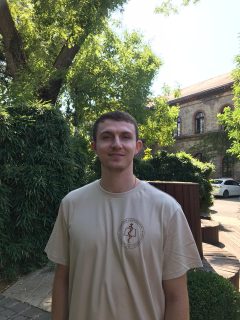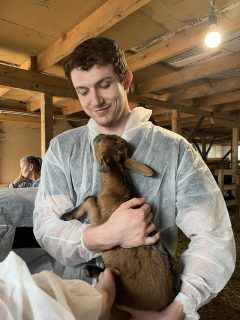David Gamba’s journey into veterinary medicine wasn’t a clear-cut path. Growing up without a connection to the veterinary field, he explored various options within the realm of science and medicine. Only after discovering the University of Veterinary Medicine Budapest did everything seem to fall into place. Despite his family’s initial scepticism, since David had been known to change his mind frequently, they supported his decision to pursue a career in veterinary medicine. Now, heading into his fifth year, he’s confident that he made the right choice.
You have a unique background as half Hungarian and half American. Can you tell us a bit about your family?
Sure! Actually, my dad is Italian, and my mom is Hungarian. They both grew up in their respective countries and met in the United States. I was born and raised about an hour away from San Francisco in California. My mom worked as a bookkeeper, and my dad was involved in maintenance work. Neither of them had any connection to the veterinary field or medicine, so it’s all new for me and my family, although I grew up around animals; we always had cats and dogs.
Do you speak Hungarian and Italian as well?
I started learning Hungarian after we moved here. Growing up, my mom tried speaking to me in Hungarian, but I was quite stubborn and didn’t want to learn it then. So, I only had basic Hungarian knowledge when I arrived. My Italian is even worse because my dad didn’t try to teach me at all. So, it was just English in the U.S., but since moving here, I’ve been learning Hungarian.
In 2018, I had just finished my second year of high school in the U.S. My sister had already graduated and wanted to study physiotherapy in Hungary. We found an online American school so I could finish my American studies while living here, but my mom also wanted me to attend a Hungarian high school. When I joined there, I didn’t speak Hungarian, so I was basically learning Hungarian and then learning all these subjects in Hungarian. Even learning German through Hungarian. I ended up doing both for a while, but eventually, I dropped out of the Hungarian school and joined the international program here at the University. It’s much easier to study in my mother tongue.
Why did you choose to study veterinary medicine?
I’ve always been interested in science-related subjects, and as I got older, my interest in medicine grew stronger. At first, I was interested in anaesthesiology, but when I found out about this university, something just clicked; it was kind of a light bulb moment. Even though my parents were a bit sceptical, I managed to convince them, and now, as I’m heading into my fifth year, I think it’s all worked out well.
You are a student member of the Senate, aren’t you?
Yes, I started as a class representative in my first year, and then I became an international student representative for the student council in my second year. That’s when I got involved with the Senate. To tell you the truth, I didn’t know what I was signing up for – I thought it was just student council meetings. But then I walked in and saw many professors and the Rector, I was quite surprised. My role in the Senate is mostly about representing international students, attending meetings, voting on various matters, and helping the HÖK with events. It’s been a great way to practice my Hungarian, and it’s nice to be involved in shaping the university experience.
You’ve had a lot of courses so far. Which one do you prefer, and was there any course that was challenging for you?
Each year, I usually find a favourite subject, one that motivates me to study and learn better. In my first two years, that was Anatomy – it’s probably my favourite overall. I enjoyed it so much that I became a student demonstrator in the Anatomy department. I also liked Pharmacology and Pathology, which I’ve taken in the past two years. It’s hard for me to pinpoint a tough subject because I tend to put so much effort into the bigger modules that they don’t seem as difficult. The smaller subjects, on the other hand, can be a bit more challenging because I don’t give them as much attention. For most students, the bigger subjects are usually harder because there’s more material to learn, but for me, it’s the opposite.
If I had to name the hardest exam, it might be the recent equine exam from last semester. It was tough, but overall, I don’t consider any exam particularly hard. I put in the work, and a little luck helps, too. I’m generally fine with all the exams, and I try to stay stress-free by viewing them as knowledge checkpoints rather than something to stress over.
You have already started your thesis. Can you tell us about it?
Yes, I am writing my thesis in the Department of Pharmacology under the supervision of Dr. Erzsébet Gere. She is fantastic, she understands students’ situations and makes the process of learning to do scientific writing so easy. My topic involves studying the pharmacokinetic and pharmacodynamic properties, as well as the antiviral properties, of some novel drugs that inhibit host-cell proteases to prevent viral spread. I began working on it last summer, and we’ve already published a paper on the research. Now, I’m rewriting it for the TDK (a student research competition), and I’ll present it to the board in November.
What are your plans for the future? Do you have a clear direction, or are you waiting for opportunities to come your way?
It’s a bit of both. When I joined the university, I didn’t have a clear plan, and I still don’t entirely. I’m leaning towards certain fields, like large animals rather than small animals, but I’m open to working in different environments for the experience. I’m also considering pursuing a PhD, as some professors have suggested, especially in Pathology, which I find very interesting.
I might stay here at the university in Hungary to do a PhD and possibly work in the field to gain some practical experience. I’ve enjoyed the work I’ve done so far, both in research and in clinics, so I’m keeping my options open as I move forward.
Do you miss the U.S.?
Not really. I keep in touch with a few close friends there, but I’ve grown to like the European lifestyle and culture. I’d like to do more travelling in the U.S., but I don’t feel any urge to go back, work there, or do anything more than visit. This is different from how I felt when I first joined the university, as I initially wanted to return to the U.S., but my mind has changed now. I like being in Europe, and while I’m not sure if I’ll stay in Hungary, I think I’ll probably remain in Europe for at least a couple of years after graduation.
What do you do in your free time?
I started getting into older music, especially rock and its subgenres, from the 70s to the 90s, just before the pandemic. This interest led me to want to learn guitar, so during the lockdown, I got a guitar for Christmas and began teaching myself through YouTube. Lately, I’ve started taking my health more seriously and have begun exercising more regularly. On weekends, I usually spend time with my family, travelling around Hungary, visiting different towns, or sometimes hiking. They live in Velence, so it’s easy to go biking around the lake.
I am curious – what kind of food do you eat at home, given your Hungarian, Italian, American heritage?
Our meals are quite diverse, but pasta is a big part of our diet, so usually, we eat something Italian-based. My dad, who’s retired now, does most of the cooking and has tried picking up some Hungarian recipes, like lecsó and gulyás. We still have American-style barbecues sometimes, so our meal plan is pretty varied.

